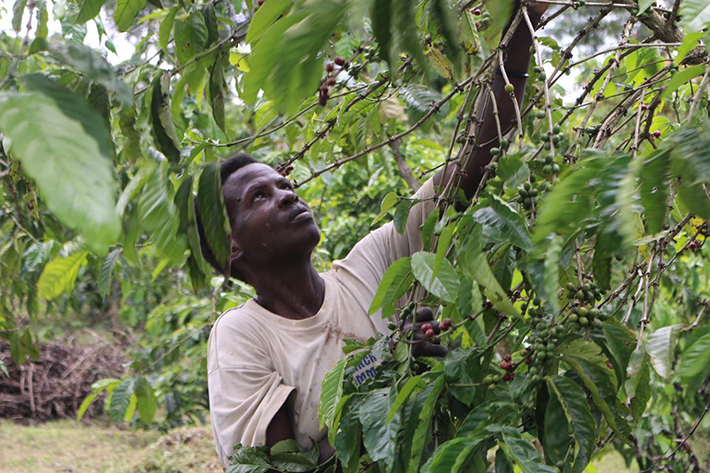|
||||||||||
| Home Top News Economy/Tech Culture/Sports China in Foreign Eyes Green Development Videos Intangible Cultural Heritages |
|
||||||||||
| Home Top News Economy/Tech Culture/Sports China in Foreign Eyes Green Development Videos Intangible Cultural Heritages |
| ChinAfrica |
| It’s Coffee Time |
| China’s growing number of coffee consumers helps to boost Uganda’s coffee production |
| By Godfrey Olukya | VOL.17 August 2025 ·2025-07-24 |

Coffee farmer Nelson Mutabazi picks coffee beans at his farm in Ntungamu District in western Uganda (GODFREY OLUKYA)
In recent years, China has witnessed a significant surge in coffee consumption, driven by a growing middle class and increasing demand for specialty brews. This trend has had a profound impact on coffee-producing countries around the world, including Uganda.
“China is one of the biggest importers of Uganda’s coffee. Unlike in the past, China now imports a lot of our coffee and we are happy that we are among their main exporters of coffee,” said Uganda’s Vice President Jessica Alupo while addressing the media in an interview in Kampala.
According to German statistics platform Statista, China’s coffee market is estimated at $11.5 billion in annual sales and is expected to grow by 10 percent in the next five years. Additionally, coffee consumption in China is growing between 15 and 20 percent annually. China is also global giant coffeehouse chain Starbucks’ second-largest market after the US.
Uganda’s coffee industry rebooted
In the 1960s, coffee was the main cash crop in Uganda, but political upheavals in the 1970s and 1980s led to the coffee sector collapsing. This resulted in many farmers cutting down their coffee plantations because the prices on world markets were so low. Since 2000, the government has endeavoured to revitalise the coffee industry.
A few years ago, Ugandan President Yoweri Museveni promoted the growth of coffee in the country by supplying free coffee seedlings to farmers in coffee-growing areas.
“I am happy that some people took my advice and that has led to an increase in coffee production. I have always encouraged people with at least 4 acres (1.6 hectares) of land to at least grow coffee in one of the acres of land and use the other three to grow food and grass for feeding animals and rearing animals. And I am happy now when I see people benefitting from the high prices of coffee,” said Museveni on 12 May while addressing residents of Kasese District in western Uganda.
“When Uganda started cooperating with China in coffee trade, China started importing Ugandan coffee and domestic prices went up, so many people started growing coffee. Subsequently, national coffee production rose,” said Matia Kasaija, minister of finance, planning and economic development.
China’s lucrative market
Over time, Uganda’s coffee exports to China have surged, marking a significant shift in the country’s coffee industry. According to Uganda’s Ministry of Agriculture, Animal Industry and Fisheries, between February and March, Ugandan coffee exports to China saw a dramatic 190 percent increase. In March alone, Uganda shipped 35,532 bags of coffee to China, a substantial rise from the 12,264 bags exported in February. Each bag weighs 60 kg.
This increase has propelled China to become Uganda’s second-largest coffee market in Asia, surpassing Japan, and the sixth-largest globally.
Charlotte Kemigisha, spokesperson of Uganda’s Ministry of Agriculture, Animal Industry and Fisheries, told ChinAfrica that the amount of coffee and money earned from the sales of coffee to China are rising year on year. “In 2019–2020, we exported 33,328 bags of coffee to China and received $3.7 million. In 2020–2021, we exported 80,549 bags and earned $8.37 million. In 2021–2022, we exported 38,097 bags and received $6.82 million. In 2022–2023, we exported 54,822 bags and earned $9.1 million. In 2023–2024, we exported 62,980 bags and earned $12.5 million,” said Kemigisha.
Kemigisha said that the cooperation between Uganda and China in coffee trade is growing steadily and one of the indicators is the very recent visit of a delegation of prominent Chinese coffee industry representatives who were in the country from 12 to 17 May.
According to Doryn Negesa, principal marketing officer of the Ministry of Agriculture, Animal Industry and Fisheries, the delegation from China toured coffee farms, washing stations, and export hubs in Uganda.
She said Uganda is benefitting from its cooperation with China in coffee-related trade. “Our objective has always been clear from the start: make Uganda the preferred origin for high-quality, traceable coffee,” she said.
Uganda’s Minister of Foreign Affairs Jeje Odong said, “Uganda has succeeded in exporting much coffee to China for several reasons, including a coordinated campaign spearheaded by Ugandan Embassy in Beijing, the Consulate General in Guangzhou and the Ministry of Agriculture, Animal Industry and Fisheries, and a good cooperation with China.”
Mutual coffee-related benefits
The increased demand from Chinese consumers has brought numerous benefits to Ugandan coffee farmers, including increased income and improved livelihoods.
Robert Bogere, chairman of the Coffee Farmers Association in East Uganda, said, “As farmers of coffee, we have seen a significant increase in our income. The growth of the coffee industry has led to improved livelihoods to us farmers and our families.”
Chinese coffee dealer in Uganda Zhang Wei told ChinAfrica that the growing coffee consumption in China has also benefitted his country in several ways, including access to Uganda’s high quality coffee.
“China has gained access to Uganda’s high quality Arabica coffee, which is in high demand internationally. The coffee trade between Uganda and China has also generated significant economic benefits for China, including investment opportunities,” said Zhang.
| About Us | Contact Us | Advertise with Us | Subscribe |
| Copyright Beijing Review All rights reserved 京ICP备08005356号-5 京公网安备110102005860号 |